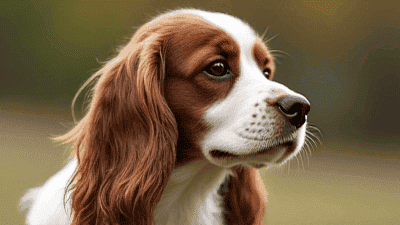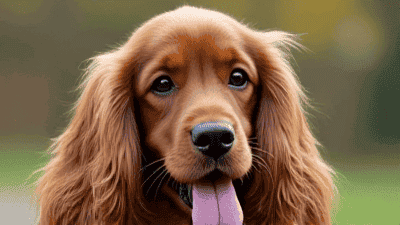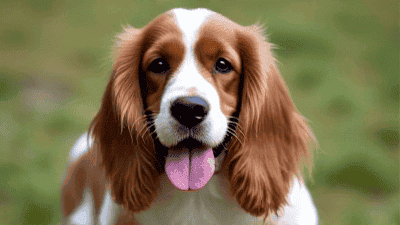
Cocker Spaniels are one of the most beloved dog breeds, known for their affectionate nature, beautiful coats, and wagging tails that seem to never stop. These charming dogs have won the hearts of families around the world with their playful personality and loyalty. However, owning a Cocker Spaniel comes with specific responsibilities, especially when it comes to grooming and training. Their long, silky coats and energetic temperament require regular care and positive reinforcement to ensure they thrive.
The Cocker Spaniel originated in Spain as a hunting dog, bred to flush out woodcock (hence the name “Cocker”). Over time, they became popular in England and the United States as both hunting companions and family pets.
Cocker Spaniels are medium-sized dogs, weighing between 20-30 pounds and standing about 13-16 inches tall. They are known for their expressive eyes, long floppy ears, and luxurious, wavy coats that come in a variety of colors, including black, golden, and parti-colored.
Cocker Spaniels are affectionate, intelligent, and eager to please. They are social dogs that thrive on human interaction and enjoy being part of family activities. Their playful and gentle nature makes them great companions for children and adults alike.

Cocker Spaniels have long, dense coats that require regular maintenance to prevent matting, tangles, and skin issues. Proper grooming also helps keep their ears clean and reduces the risk of infections.
Brush your Cocker Spaniel’s coat at least 2-3 times a week to remove tangles and prevent matting. Start at the base of the hair and work your way up, paying extra attention to areas like the ears, legs, and belly.
Bathe your Cocker Spaniel every 4-6 weeks using a gentle, dog-safe shampoo. Be sure to rinse thoroughly to avoid residue, which can irritate the skin. After bathing, towel dry and use a blow dryer on a low setting to prevent dampness.
Regular trimming is essential to maintain your Cocker Spaniel’s coat and prevent it from becoming overgrown. Focus on areas like the ears, paws, and tail. If you’re not confident trimming at home, consider taking your dog to a professional groomer.
Cocker Spaniels are prone to ear infections due to their long, floppy ears that trap moisture. Clean their ears weekly with a veterinarian-recommended ear cleaning solution and cotton balls. Avoid inserting anything deep into the ear canal.
Trim your dog’s nails every 3-4 weeks to prevent overgrowth and discomfort. If you’re unsure how to trim nails safely, ask your veterinarian or groomer for guidance.
Brush your Cocker Spaniel’s teeth daily or at least 2-3 times a week to prevent tartar buildup and maintain oral health. Use a dog-specific toothbrush and toothpaste.
Cocker Spaniels are intelligent and eager to please, which makes them relatively easy to train. However, they can also be sensitive, so positive reinforcement is key to successful training.
Here are some essential commands to teach your Cocker Spaniel:
Cocker Spaniels are quick learners when it comes to house training. Establish a routine by taking them out first thing in the morning, after meals, and before bedtime. Reward them with praise and treats when they go outside.
Expose your Cocker Spaniel to different people, animals, and environments from a young age to help them become well-rounded and confident. This also reduces the risk of fear-based behaviors.
Cocker Spaniels can develop separation anxiety or become overly excited if not properly trained. Use positive reinforcement to address these issues and consider crate training to help with anxiety.

Cocker Spaniels are active dogs that require at least 30-60 minutes of exercise each day. Activities like walking, playing fetch, or visiting a dog park can help keep them physically fit and mentally stimulated.
In addition to physical exercise, Cocker Spaniels need mental challenges to keep them engaged. Puzzle toys, obedience training, and interactive games are great ways to stimulate their minds.
Cocker Spaniels are generally healthy dogs, but they are prone to certain health conditions, including:
Regular veterinary checkups, a balanced diet, and proper grooming can help prevent many health issues. Be proactive in monitoring your dog’s health and seek veterinary care if you notice any concerning symptoms.

Cocker Spaniels should be fed high-quality dog food that meets their nutritional needs. Follow the feeding guidelines on the packaging and adjust portion sizes based on your dog’s age, size, and activity level.
Cocker Spaniels are prone to obesity, which can lead to health problems. Avoid overfeeding and provide regular exercise to maintain a healthy weight.
If your Cocker Spaniel has allergies or other health conditions, consult your veterinarian for dietary recommendations.
Cocker Spaniels are loyal and loving companions that bring joy to their families. Their affectionate nature and playful spirit make them excellent pets for individuals and families alike.
With their intelligence and eagerness to please, Cocker Spaniels excel in obedience training and thrive on positive reinforcement.
Whether you’re an active family or a retiree looking for a loving companion, a Cocker Spaniel can adapt to your lifestyle and become a cherished member of your household.
The Cocker Spaniel is a heartwarming breed that offers endless love and companionship to their families. By understanding their grooming and training needs, you can ensure your Cocker Spaniel stays healthy, happy, and well-behaved. Regular grooming, positive reinforcement training, and proper care will help your Cocker Spaniel thrive and become the perfect furry friend. Whether you’re a seasoned dog owner or a first-time pet parent, the Cocker Spaniel’s charm and devotion will undoubtedly make them a cherished part of your life.